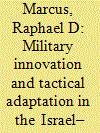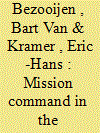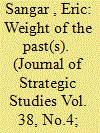| Srl | Item |
| 1 |
ID:
138743


|
|
|
|
|
| Summary/Abstract |
What explains the pace at which militaries adopt new technology? We argue that the hierarchical structure and unique expertise requirements of military organizations combine to empower select individuals as ‘gatekeepers’ of innovation. These individuals acquire beliefs throughout their military careers regarding the nature and means of warfare that act to shape their attitudes towards new military innovations. By filtering, sidelining, and ignoring competing sources of advice and information, these officers actively inhibit the adoption of new, often advantageous, innovations. We develop this argument through the analysis of two cases: the delayed acquisition of breech-loading and repeating rifles by the Union Army during the American Civil War, and the failure of the US Army to adopt an adequate heavy-type tank in World War II.
|
|
|
|
|
|
|
|
|
|
|
|
|
|
|
|
| 2 |
ID:
138744


|
|
|
|
|
| Summary/Abstract |
This article highlights a pattern of military adaptation and tactical problem-solving utilized by the Israel Defense Forces (IDF) while engaged in protracted conflict with the Lebanese militant group Hizballah. It discusses the IDF’s recent attempts to institutionalize their historically intuitive process of ad-hoc learning by developing a formal tactical-level mechanism for ‘knowledge management’. The diffusion of this battlefield lesson-learning system that originated at lower-levels of the organization is examined, as well as its implementation and effectiveness during the 2006 Lebanon War. A nuanced analysis of IDF adaptation illustrates the dynamic interplay between both ‘top-down’ and ‘bottom-up’ processes of military innovation.
|
|
|
|
|
|
|
|
|
|
|
|
|
|
|
|
| 3 |
ID:
138742


|
|
|
|
|
| Summary/Abstract |
Theory on the use of information technology in military operations assumes that bringing together units in an information network helps units to work together. Decentralized command systems such as mission command have been proposed for these networks, so that units can adapt to changes in their turbulent working environments. Others have proposed centralized command systems that permit higher organizational levels to closely direct military operations. This article uses Perrow’s (1984, 1999) Normal Accidents Theory to propose that increasing interdependencies between units in information networks places incompatible demands on the design of networked military operations. It is concluded that networked military operations require decentralized command approaches, but only under the condition that interdependencies between modules of networked units are weak rather than tight. This precondition is essential for retaining control over networked military operations.
|
|
|
|
|
|
|
|
|
|
|
|
|
|
|
|
| 4 |
ID:
138745


|
|
|
|
|
| Summary/Abstract |
Wartime adaptation is a process of adjustment from the war you planned for to the one you have. This process of adjustment is done, in part, by the practitioners of war in the theater of conflict–soldier-led adaptation. Drawing upon two case studies of gun truck development in Iraq and Vietnam I argue that soldiers created networks in order to adapt to battlefield challenges and that the pattern of those networks carries implications for the likelihood of formal adoption by the organization. Simply put, the pattern of the flow of ideas, resources, and skills across the battlefield may affect the likelihood of bottom-up adaptation.
|
|
|
|
|
|
|
|
|
|
|
|
|
|
|
|
| 5 |
ID:
138741


|
|
|
|
|
| Summary/Abstract |
This article seeks to explain the basic dynamics of the development of the German military approach in Afghanistan between 2003 and 2010 by looking at the impact of the Bundeswehr’s established uses of historical experience. First, the German military approach in Afghanistan has slowly evolved from a peacebuilding and mediation mission towards a full-fledged combat deployment. Second, the Bundeswehr’s exclusive focus on the World War II experience has contributed to the emergence of the Balkans experience as a formative experience that shaped initial operational thinking in Afghanistan. Third, because a thorough debate on the historical foundation of counterinsurgency remained absent, the operational shift in 2009 was perceived as a return to ‘classical’ military tasks and thus led to an almost exclusive focus on training for combat.
|
|
|
|
|
|
|
|
|
|
|
|
|
|
|
|